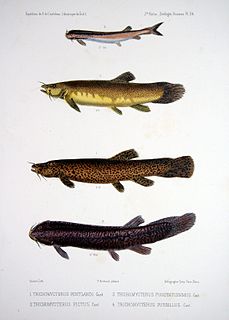 W
WTrichomycteridae is a family of catfishes commonly known as pencil catfishes or parasitic catfishes. This family includes the candiru fish, feared by some people for its alleged habit of entering into the urethra of humans. Another species is the life monsefuano which was important to the Moche culture and still an important part of Peruvian cuisine.
 W
WBullockia maldonadoi is a species of catfish of the family Trichomycteridae, and the only species of the genus Bullockia. This fish grows to about 7 centimetres (2.8 in) and originates from Chile.
 W
WBullockia maldonadoi is a species of catfish of the family Trichomycteridae, and the only species of the genus Bullockia. This fish grows to about 7 centimetres (2.8 in) and originates from Chile.
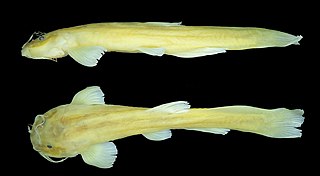 W
WCopionodon is a genus of catfishes of the family Trichomycteridae. It includes three species, C. lianae, C. orthiocarinatus, and C. pecten.
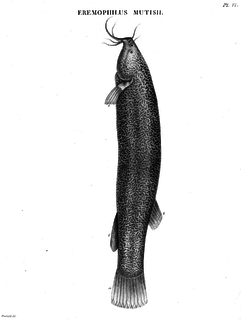 W
WEremophilus mutisii is a species of catfish of the family Trichomycteridae, and the only member of its genus. This fish grows to about 30 centimetres (12 in) and originates from the Bogotá River basin, which is a tributary of the Magdalena River. It has probably been introduced to Ubaté, Chiquinquirá, and Tundama valleys, Colombia.
 W
WEremophilus mutisii is a species of catfish of the family Trichomycteridae, and the only member of its genus. This fish grows to about 30 centimetres (12 in) and originates from the Bogotá River basin, which is a tributary of the Magdalena River. It has probably been introduced to Ubaté, Chiquinquirá, and Tundama valleys, Colombia.
 W
WHenonemus is a genus of pencil catfishes native to South America.
 W
WHomodiaetus is a genus of pencil catfishes native to South America.
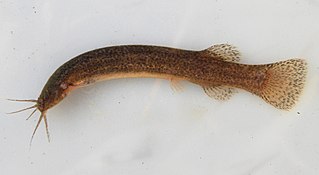 W
WItuglanis is a genus of small freshwater fish in the family Trichomycteridae native to South America. Their greatest diversity seems to occur in the Amazon River basin. Most species inhabit leaf litter, with several species living in caves.
 W
WPareiodon microps is a species of catfish of the family Trichomycteridae, and the only species of the genus Pareiodon. It is endemic to Brazil where it occurs in the Amazon Basin.
 W
WPareiodon microps is a species of catfish of the family Trichomycteridae, and the only species of the genus Pareiodon. It is endemic to Brazil where it occurs in the Amazon Basin.
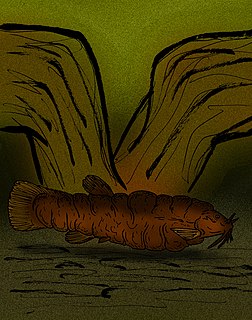 W
WRhizosomichthys totae is a species of catfish of the family Trichomycteridae, and the only species of the genus Rhizosomichthys. This fish grew to about 13.8 centimetres (5.4 in) and was endemic to Colombia where it occurred in the Lake Tota basin. It is listed as a critically endangered species by the IUCN Red List.
 W
WRhizosomichthys totae is a species of catfish of the family Trichomycteridae, and the only species of the genus Rhizosomichthys. This fish grew to about 13.8 centimetres (5.4 in) and was endemic to Colombia where it occurred in the Lake Tota basin. It is listed as a critically endangered species by the IUCN Red List.
 W
WThe Trichomycterinae are a subfamily of catfishes of the family Trichomycteridae. It includes six genera, Bullockia, Hatcheria, Rhizosomichthys, and Eremophilus, all monotypic, Silvinichthys with two species, and Trichomycterus, with over 100 species. The former five genera are diagnosed by putatively apomorphic characters, whereas Trichomycterus is defined by the lack of those specializations and is likely not monophyletic. This subfamily has historically served as much of a wastebasket for trichomycterids that lack the specializations of the other subfamilies. Species of Trichomycterinae dwell in headwaters and small, cold clear water streams running over stony beds. Due to the patchy distribution of their habitats, trichomycterines generally have restricted geographic distributions, thus display a high level of endemism.
 W
WTrichomycterus is a genus of fish in the family Trichomycteridae, the largest genus of its family with over 170 species currently described. This genus is native to freshwater habitats in Central and South America. These fish are generally small, usually about 5 to 15 cm (2–6 in) in standard length, although the largest, T. rivulatus, can reach more than twice this size. Species differ from one another primarily in body proportions, fin ray counts and colouration. Despite their relatively small size, some, such as T. punctulatus, support fisheries and are important in the local cuisine.